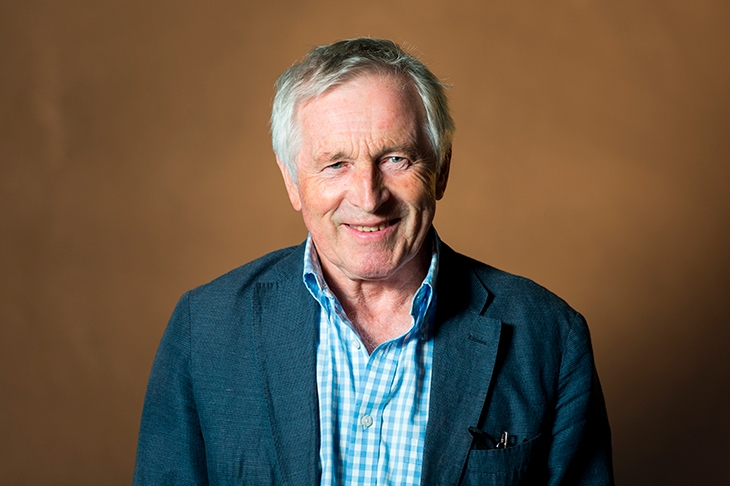There’s been a Dimbleby on air since before I was born but last Friday saw the end of that era when Jonathan retired as chairman of Radio 4’s Any Questions after 32 years. It’s a bit like imagining life in Britain once the Queen dies. The Dimbleby family has been intertwined with the history of the BBC, and major national events, since the second world war when Richard, the father, carved out his career as a war reporter, most famously from Belsen in 1945. Mere mention of the name conjures up those Reithian values — clear reportage, an intelligent and fair-minded assessment of what’s going on, and access to that information for everyone.
At the end of his final programme Jonathan reiterated the motto by which the BBC has been governed since Reith was in charge — education, information and entertainment — almost, it felt, as a rallying cry to all those who still believe in its relevance. Rise up and defend this appeared to be his parting words. ‘Radio 4 is the jewel in the BBC’s crown,’ he declared. ‘For all its flaws, the BBC is a peerless public-service broadcaster.’ But, he added, it’s having to negotiate through ‘very choppy waters’. As I write no successor has been announced for Any Questions (or for the job of controller of Radio 4), which is odd. It’s like leaving the bridge of a great cargo ship unmanned.
Listening to his guests, those former political giants David Blunkett and Chris Patten, was also like going back to a time when politicians spoke some sense and had a sense of humour. In an answer to a question about the implications of what President Putin had said at the G20 Summit in Osaka suggesting that liberal values have become obsolete because they conflict with the interests of the overwhelming majority, Patten said bluntly and boldly: ‘He’s a killer.’ Blunkett, meanwhile, recalled once meeting the Russian President in the presence of the Queen. His dog began barking and would not stop. Blunkett felt obliged to apologise, to which the Queen replied: ‘Dogs have interesting instincts, don’t they?’
Daphne: A Fire in Malta, this week’s dramatised serial on Radio 4 written by Lizzie Nunnery (and with polished direction by Sasha Yevtushenko), gave us another kind of journalism, not impartial at all yet driven by the same instincts for truth and transparency. It took us back to October 2017 when the Maltese journalist Daphne Caruana Galizia was blown up by a car bomb as she set off for the bank to sort out her account, which had been frozen by the government. Caruana Galizia, who was 53 when she was killed, devoted her life to exposing corruption in Malta and especially in the Labour party, which had won a landslide victory four years earlier. In particular she was looking into the practice of selling passport identities to rich foreigners, often Russian oligarchs, who through Malta could get access to the EU. She was also one of the first journalists to hint at offshore trusts and links with Panama in her blog Running Commentary. No one has yet been brought to trial for her death.
We are given no sense that this drama is unfolding in Malta or any other Mediterranean country, apart from the odd mention of ravioli and hot air. Maybe this is deliberate? Maybe it’s to make us think this kind of corruption, and squashing of all those trying to uncover it, could be happening anywhere? Nunnery’s quest is to find out why Caruana Galizia (played by Michelle Fairley) was prepared to risk everything to uncover what she believed to be wrong. ‘Is everyone weak?’ she asks, frustrated that no one else is investigating what she is so driven to find out. ‘Is everyone just a coward?’ Not everyone, she’s told. ‘Just most of us.’
The poet Hannah Lowe was also on a quest when she came to write her long poem Borderliners, read melodically on Radio 4 by Burt Caesar and cleverly woven together with Lowe’s own memories by producer Jo Wheeler. Lowe’s father was born in Jamaica in 1927, the son of a Chinese father and black Jamaican mother; a reminder that when slavery was abolished other labourers had to be found to harvest and treat the sugar cane. Chinese indentured labour was brought to the West Indies instead. Lowe’s father migrated to London when he was 20, married an Englishwoman, and rarely spoke about Jamaica. Rather he loved to eat dim sum with chopsticks, to cook Cantonese-style and play mah-jong.
Lowe says: ‘I was so confused. I look white but I never felt white or English. I never felt my identity was settled in any way.’ She felt rather that she was, like her father, ‘a Borderliner’, as is her son, who has red hair and pale skin derived from his part-Scottish father. To be a borderliner, she says, is to be uncertain, debatable. In her poem she is seeking to make contact with her Jamaican grandmother about whom she knows so little, to reconcile the different parts of her make-up. A DNA test reveals that Lowe has connections with every continent. It’s not about where, she concludes, but why and who.






Comments